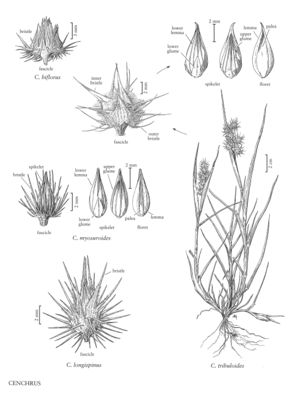Difference between revisions of "Cenchrus myosuroides"
FNA>Volume Importer |
imported>Volume Importer |
||
| (5 intermediate revisions by 2 users not shown) | |||
| Line 26: | Line 26: | ||
-->{{#Taxon: | -->{{#Taxon: | ||
name=Cenchrus myosuroides | name=Cenchrus myosuroides | ||
| − | |||
|authority=Kunth | |authority=Kunth | ||
|rank=species | |rank=species | ||
| Line 33: | Line 32: | ||
|basionyms= | |basionyms= | ||
|family=Poaceae | |family=Poaceae | ||
| + | |illustrator=Linda A. Vorobik;Annaliese Miller | ||
| + | |illustration copyright=Utah State University | ||
|distribution=Puerto Rico;Tex.;La.;Ala.;Ga.;S.C.;Fla. | |distribution=Puerto Rico;Tex.;La.;Ala.;Ga.;S.C.;Fla. | ||
|reference=None | |reference=None | ||
| Line 38: | Line 39: | ||
|publication year= | |publication year= | ||
|special status= | |special status= | ||
| − | |source xml=https:// | + | |source xml=https://bitbucket.org/aafc-mbb/fna-data-curation/src/200273ad09963decb8fc72550212de541d86569d/coarse_grained_fna_xml/V25/V25_1379.xml |
|subfamily=Poaceae subfam. Panicoideae | |subfamily=Poaceae subfam. Panicoideae | ||
|tribe=Poaceae tribe Paniceae | |tribe=Poaceae tribe Paniceae | ||
Latest revision as of 17:56, 11 May 2021
Plants perennial. Culms 5-200 cm, stout, glaucous. Sheaths from shorter than to equaling the internodes; ligules 1.5-2(3.4) mm; blades 12-40 cm long, 4-13 mm wide, glabrous or sparsely pilose adaxially. Panicles 4-23 cm; fascicles 3.8-8 mm long, 1.2-2.6 mm wide, composed of several whorls of bristles, not burlike; bristles 3-5.8 mm long, 0.2-0.6 mm wide, fused only at the base, not forming a cupule, terete, increasing in size inwards, inner bristles pubescent on the lower 1/2 - 2/3. Spikelets 1(2-3) per fascicle, 3.8-4.8(5.6) mm. Lower glumes 1.5-3 mm; upper glumes 3-5 mm, 3-5-veined; lower lemmas 3-5.5 mm; upper lemmas 3.8-5.4 mm; anthers 0.8-2.2 mm. Caryopses 1.5-2.6 mm long, 1-1.5 mm wide, ovoid. 2n = (54), 70.
Distribution
Puerto Rico, Tex., La., Ala., Ga., S.C., Fla.
Discussion
Cenchrus myosuroides is a native species that grows mostly along roadsides and in other waste places. Its native range extends through the Caribbean and Central America to northern South America.
Selected References
None.
